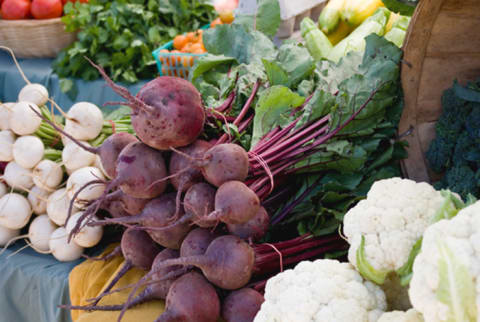Advertisement


The food industry wants us to believe that cooking is time-consuming, inconvenient, and expensive. Fast-food manufacturers and grocers have brainwashed us to believe that we “deserve a break" from the kitchen. And so they lure us in with their convenient, heavily processed meals.
The problem is that these meals take a toll on your waistline, overall health, and even your budget. That’s why, more than ever, it's important to reconnect with our kitchen, discover the bounty of benefits it offers, and learn just how inexpensive preparing your own healthy food can be.
Here's the truth: you can eat well for less money by making whole, fresh food. A simple dinner of roasted chicken, vegetables, and salad can cost about half of what dinner at a fast-food restaurant would. But today, more than half of the average American's food budget goes toward meals consumed outside the home.
Of course, I understand the challenges of trying to eat well with limited financial resources, limited time, or both — but I firmly believe you don't need to be rich or retired to eat well and take care of yourself.
In fact, I know firsthand what it’s like to live on very little. In college and medical school, I had $300 a month to cover rent, food, and entertainment. And in residency, I lived on $27,000 a year while supporting a wife and two children. Even two decades ago, that wasn’t much for a family of four.
"You don't need to be rich or retired to eat well."
These days, I’m even busier — but I haven’t forgotten how to prepare healthy foods with little money and time.
And I’ve met numerous folks with limited finances and time who nonetheless have access to good-quality food. Trust me, they don’t search out arcane ingredients or shop at trendy food boutiques. Instead, they realize the value of eating healthy and employ some savvy methods to make their food budget work harder.
So when patients ask me how they can eat healthier with limited time or money, here are the seven strategies I recommend:
1. Opt for seasonal produce.
You almost always get fresher produce, probably locally grown, for less money when it's in season. Find out more about when certain fruits and veggies are in season.
2. Buy organic for the "Dirty Dozen."
Not everyone has the budget to buy 100 percent organic — but the more we do, the more we can avoid contaminated foods and better our health. To figure out where you should always go organic on produce, check out the Environmental Working Group's list of the Dirty Dozen, as well as less-contaminated produce on the Clean Fifteen.
3. Check out discount grocery stores.
For cheaper sources of fresh foods, my top choices are stores like Trader Joe’s and shopping clubs like Costco or Sam’s Club. There, my family buys vegetables, olive oil, fruits, nuts, canned beans, sardines, and salmon at much lower prices than regular supermarkets.
4. Consider a local food co-op.
Co-ops are community-based organizations that support local farmers and businesses and allow you to order foods and products in bulk. This takes a bit of advanced planning but can usually save you money.
5. Join a community-supported agriculture program.
Buy direct and cut out the middleman with a CSA. We get organic, mostly seasonal, local vegetables delivered to our house for our family of four for $55 a week, or a little more than $10 a person per week. We don’t always get to choose what we receive, but it makes us more creative cooks.
6. Keep healthy basics on hand.
Develop a repertoire of cheap, easy-to-prepare meals. Having the ingredients available at home at all times means you don’t get stuck eating food that doesn’t help create health. This takes planning but is well worth it. Learn more about what ingredients to stock up on.
7. Order staples online.
Why pay retail for healthy kitchen staples like turmeric, coconut oil, and almond butter? Online stores, like Thrive Market, offer discount prices on healthy, organic foods and products, often at 25 to 50 percent below retail.
I bet you’ve got a few budget-minded healthy eating strategies of your own. I'd love to hear them! Please share below or on my Facebook page.

Dr. Mark Hyman is a practicing family physician and an internationally recognized leader, speaker, educator, and advocate in the field of Functional Medicine. He is the founder and director of The UltraWellness Center, the Head of Strategy and Innovation of the Cleveland Clinic Center for Functional Medicine, a 13-time New York Times best-selling author, and Board President for Clinical Affairs for The Institute for Functional Medicine. He is the host of one of the leading health podcasts, The Doctor’s Farmacy. Dr. Hyman is a regular medical contributor on several television shows and networks, including CBS This Morning, Today, Good Morning America, The View, and CNN. He is also an advisor and guest co-host on The Dr. Oz Show.
More from the author:
Functional Nutrition Training
Check out Functional Nutrition Coaching
A cutting-edge nutrition deep dive taught by 20+ top health & wellness experts
Learn moreMore from the author:
Functional Nutrition Training
Check out Functional Nutrition Coaching
A cutting-edge nutrition deep dive taught by 20+ top health & wellness experts
Learn more
Dr. Mark Hyman is a practicing family physician and an internationally recognized leader, speaker, educator, and advocate in the field of Functional Medicine. He is the founder and director of The UltraWellness Center, the Head of Strategy and Innovation of the Cleveland Clinic Center for Functional Medicine, a 13-time New York Times best-selling author, and Board President for Clinical Affairs for The Institute for Functional Medicine. He is the host of one of the leading health podcasts, The Doctor’s Farmacy. Dr. Hyman is a regular medical contributor on several television shows and networks, including CBS This Morning, Today, Good Morning America, The View, and CNN. He is also an advisor and guest co-host on The Dr. Oz Show.


















